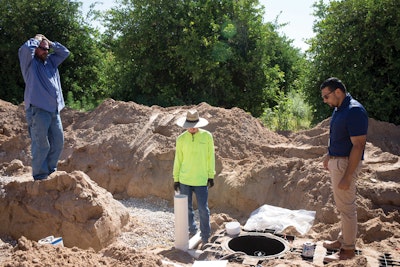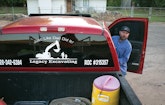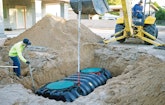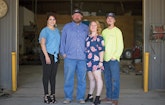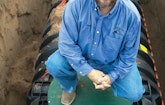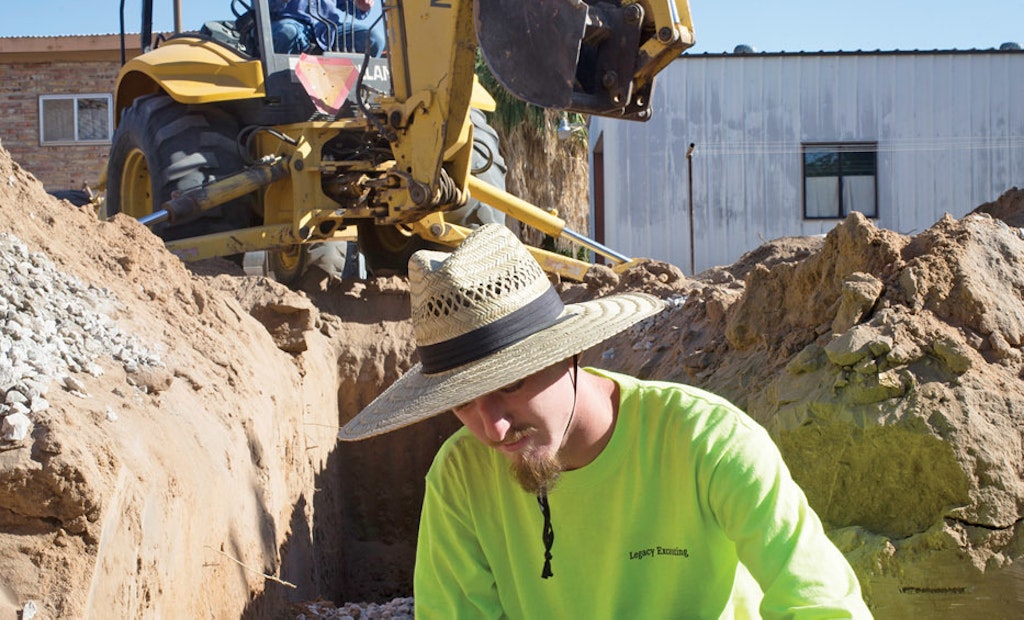
David Tuggle fits pipes while Jereme Tuggle runs the New Holland backhoe during a system installation.
Jereme Tuggle began working summers for his father’s onsite business when he was 14. His life plan was ultimately to own the company.
But no succession plan could have accounted for the tragedy that struck the family in 2017. His father, Robert Tuggle, age 58, died suddenly at home in March 2017. Not quite four months later, his mother, Monica, was killed in a vehicle accident.
At that very moment, the family’s limited liability company was dissolved, according to law. Jereme Tuggle, then 41, was faced with starting all over. He inherited his father’s equipment but had to earn his license as a qualifying party before the business could resume operation.
Encouraged by his wife, Cori Tuggle, and supported by his five siblings, he fought his way through the crisis. Today, his company, Legacy Excavating & Underground based in Yuma, Arizona, installs about 40 onsite treatment systems per year and does some smaller-scale sewer, water and fire protection line installations.
The company works in Yuma County, east of the Colorado River, which forms the border with California. The terrain includes the river valley, the plateau to the east, and the Gila Mountain foothills.
STARTING YOUNG
Jereme Tuggle had deep emotional ties to his father’s business, Rob’s Backhoe (dba Rock Solid Excavating & Underground). He recalls at age 5 sitting with his dad on a Cat D10 dozer. Rob’s Backhoe at its peak had 12 employees and built 250 to 300 onsite systems per year, in addition to waterline and sewer line installations and other site work. Business slowed down significantly when the housing market collapsed in 2010-11.
Before his parents died, Tuggle was largely running the business but had no experience with ownership. While the transition was traumatic, family ties saw him through. “I have three sisters, two brothers, and a bunch of aunts, uncles, and cousins,” he says. “My siblings and I bound together and helped each other. I don’t think any of us would have been able to get through that situation as well as we did without the other five.
“I took my dad’s death a little bit harder, just because we were so close from working together for so many years. When my mom died, of course I was sad, but at the same time, it was almost like a weight off my shoulders. I knew she was happy because she was with him.”
BACK ON TRACK
Tuggle started working on his license soon after his father passed. Arizona requires a business test and a trade test. “I had taken my business test, and the week after my mom died, I was supposed to take my trade test.
“I reached out to some friends and business people in Yuma, and I could have had a different job, but Cori kept telling me, ‘This is what you’re made for; this is what you’re meant to do.’
“It was always my plan to own the business. I just expected to inherit it while my dad was alive. I didn’t expect to be in the position I was put in.”
He pressed on and got his license. Meanwhile, the family received a life insurance settlement; instead of taking cash, Tuggle received his father’s equipment, with his siblings’ blessing. He created his own limited liability company in August and a month later had his license.
And so Legacy Excavating & Underground, named in honor of his father, was born. The team includes Jereme Tuggle and Cori Tuggle, their oldest son David Tuggle, and sister-in-law Jessica Tuggle in the office. The equipment inventory consists of two backhoes: a 2005 Case 580 Super M and a 2001 New Holland LB 110B. For challenging projects on tight residential sites, they rent a mini-excavator and a skid-steer.
Since Jereme Tuggle was at the forefront of his dad’s company, he didn’t need much promotion to get started. “I kept my dad’s office phone numbers,” he says. “All my business is word-of-mouth or residual business from my dad. Everybody still knows who I am. At times I’d answer the phone, ‘Legacy Excavation & Underground,’ and they’d say, ‘Oh, I’m sorry, I thought I reached Rob’s Backhoe.’ I’d say, ‘Hold on, this is Jereme. Same family, different name.’”
TACKLING TERRAIN
The terrain around Yuma calls for different approaches to system design. From the river about 30 miles east, the valley has rich clay soils that support a variety of agriculture. About 90 percent of sites there require advanced systems because of high groundwater.
“As you continue east, you get up on the mesa, and there it’s all sand,” Tuggle says. “When we dig, it’s like digging in the sand dunes. Many times we have to set up some kind of irrigation system to soak the ground weeks before we start the project, just so the material will stand up as we’re digging it. There it’s usually just gravel and pipe systems.” The same applies farther east in the foothills, except the soil is rocky and jobs are more difficult.
For perc tests and system designs, Tuggle relies on Kevin Dahl of Dahl Robins & Associates, the same engineer his father worked with: “I won’t go to anybody else. He’s a good man, and he does a good job.”
For alternative systems in the valley, Tuggle chooses Enviro-Septic pipes from Presby Environmental Inc. (PEI) for their ease of installation and longevity. “I really like the fact that they can be rejuvenated,” he says. “With a gravel and pipe system, I can tell the customer, ‘If this fails, call me and I’ll come in and charge you again to redo your leach lines.’ But I can put in the Presby and say, ‘Within 20 years, when this fails, it can be rejuvenated.’
“We just install a regular septic tank and use the Presby pipes on the outlet side. We don’t have to install anything in the tank. There’s no electrical and no alarms to hook up. We’ve got it down to an art. I can install a Presby almost as fast as a regular system. For rejuvenation, you’re supposed to be able to pump the system, pull the caps off the ends of the pipes and let them dry out. Then you put the caps back on and start using the system again.”
He has installed one Norweco ATU; generally that level of advanced treatment isn’t required except for lots directly on the river. He hasn’t used alternative drainfield media except for EZflow by Infiltrator on one job where he helped a fellow installer who had an overflow of work. “There was barely any room to do a system. So my buddy decided to go with the EZflow by Infiltrator. For ease of installation, that’s the way to go.”
DOING IT RIGHT
Because the housing market remains slow, many of Legacy Excavating & Underground’s projects are system replacements. No matter what system he installs, Tuggle takes pride in quality work: “When you go in and dig up somebody’s yard and put 20 or 30 tons of gravel in the ground, it’s not going to look the same as it did before you were there. But that’s my goal: to make it as close to that as I can.
“It’s got to be stressful to the homeowner. First of all, you can’t flush. Then you call somebody and they tell you it’s going cost $10,000 to fix it. You explain to them what you have to do and they’re very fearful of how that property is going to look when you’re done. Our goal is to put them at ease — give them a product that’s going to work, and that’s going to last, without disrupting their life.”
The toughest job he can remember came soon after his father died. “It was in the valley,” he recalls. “The people had a very narrow area to work in. I was able to reuse the tank, but we had to put in 210 Presby tubes. It was a doctor’s house in an affluent neighborhood. It took me about a week and a half to complete.
“I had to work in an area about 80 feet long and 12 feet wide. The trench was 8 feet wide, and I didn’t even have enough room to pile up the spoil. So I’d reach out as far as I could with the backhoe and pull all the dirt up to it. Then I had to turn around, get that dirt and haul it out, and go back in and do the same thing. Then haul in some of the sand, put in some of the tubes, and then keep going, basically 10 feet at a time. We did about 20 feet in a day.
“We stockpiled the dirt in the street. I had to go door to door and tell everybody this is what we’re going to do. It’s going to be noisy. It’s going to be messy. Please bear with us. They were all very nice, and it worked out really well. I left a card with all the people I spoke to, and as we were cleaning up, I got a couple of compliments. Hopefully some potential new business will come out of it.”
MODEST PLANS
While building the business, Tuggle doesn’t aspire to making it as big as his father’s company: “I’m happy just to be a small-town septic system installer.” And although he has four sons, he doesn’t expect to see a third generation take over the company.
David Tuggle, his oldest, is attending technical college to become a mechanic and is already highly accomplished in that area. He recently helped Jereme Tuggle rebuild the rear end on the New Holland backhoe. “At 20 years old, he’s a better mechanic than I am,” Tuggle says. “His dream is to build and sell four-wheel-drive off-road trucks. He’s a Chevy fanatic. He’s just working for me to make money right now. The business will probably end with me.”
Still, for now, Tuggle carries on a legacy that would surely make his mom and dad proud.
